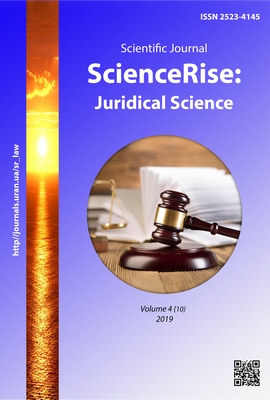The problem of withdrawing funds from insolvent banks and developing proposals to overcome it
DOI:
https://doi.org/10.15587/2523-4153.2019.188181Keywords:
banks, bankruptcy, withdrawal from the banking system, insolvent banksAbstract
In this article the author reveals the actual problems of the banking system of Ukraine in the current economic situation, in particular against the background of the massive reduction in the number of banks in the period from 2014 to 2016, a blow to financial stability. In addition, this article analyzes the main legislative changes, aimed at preventing abuse by banking system participants.
Suggestions were also made to improve the legislation of Ukraine regarding the development of effective mechanisms to prevent the withdrawal of funds from the banking system of Ukraine, as well as to hold them accountable for these actions.
The relevance of the research topic is due to the fact that the effective functioning of the banking system is one of the most important components of sustainable development of the country's economy. The development of social and political events causes the emergence of new legal relationships, which in turn create the grounds for the emergence of new types of legal responsibility and the application of new response measures.
These reasons necessitate a thorough analysis of new legal relationships in the field of banking, detailed clarification of their content.
The author conducted a thorough research and analysis of legislation, doctrine and case law in order to find out the causes and possibilities of cases of withdrawal of funds from the banking system of Ukraine. Based on the above analysis, the author has developed proposals to improve the legislation of Ukraine on the development of effective mechanisms to prevent withdrawal of funds from the banking system, as well as to hold accountable for these actions.
Thus, the author investigated the problems of the banking system of Ukraine in the current economic situation, as well as made proposals to improve the legislation of Ukraine.
References
- Pres-reliz Fondu harantuvannia vkladiv fizychnykh osib (2019). Ofitsiinyi sait Fondu harantuvannia vkladiv fizychnykh osib. Available at: http://www.fg.gov.ua/231-pres-reliz-fgv/41474-dlia-vyvedennia-i-rozkradannia-koshtiv-z-bankiv-ikh-kerivnyky-i-vlasnyky-vykorystovuiut-kilka-naiposhyrenishykh-skhem
- Zatvarska, O. O. (2004). Bankivska systema Ukrainy ta osnovni napriamy yii rozvytku. Kyiv, 20.
- Leshchenko, V. V. (2016). Orhanizatsiino-pravovyi mekhanizm derzhavnoho rehuliuvannia systemy bankivskoho nahliadu Ukrainy. Kyiv, 23.
- Shchurevych, O. I. (2017). Systema bankivskoho rehuliuvannia ta nahliadu v umovakh vidkrytoi ekonomiky Ukrainy. Lviv, 250.
- Informatsiia shchodo aktualnykh kryminalnykh provadzhennia (2017). Fond harantuvannia vkladiv fizychnykh osib. Available at: https://www.epravda.com.ua/rus/publications/2019/02/27/645657/
- Reorhanizatsiia ta likvidatsiia. Ofitsiinyi sait NBU. Available at: https://bank.gov.ua/control/uk/publish/article?art_id=75535#201
- Belinska, H. V. (2016). Aktualni problemy bankivskoi systemy Ukrainy: prychyny vynyknennia ta shliakhy rozviazannia. Fynansi, uchet, banky, 1, 34–42.
- Kryminalnyi kodeks Ukrainy. Available at: https://zakon.rada.gov.ua/laws/show/2341-14
- Kryshevych, O. V., Roshchyna, I. O. (2015). Dovedennia do bankrutstva: Kryminalno-pravovyi aspekt ta rozmezhuvannia z shakhraistvom. Yurydychnyi visnyk, 1, 143–147.
- Pro banky i bankivsku diialnist (2000). Zakon Ukrainy No. 2121-III. 07.12.2000. Available at: https://zakon.rada.gov.ua/laws/show/2121-14
- Krahlevych, V. V. (2019). Vyznachennia poviazanykh iz bankom osib yak pidstava zastosuvannia prymusovykh zakhodiv vplyvu Natsionalnym bankom Ukrainy. Aktualni problemy vdoskonalennia chynnoho zakonodavstva Ukrainy, 3–13.
Downloads
Published
How to Cite
Issue
Section
License
Copyright (c) 2019 Viacheslav Krahlevych

This work is licensed under a Creative Commons Attribution 4.0 International License.
Our journal abides by the Creative Commons CC BY copyright rights and permissions for open access journals.
Authors, who are published in this journal, agree to the following conditions:
1. The authors reserve the right to authorship of the work and pass the first publication right of this work to the journal under the terms of a Creative Commons CC BY, which allows others to freely distribute the published research with the obligatory reference to the authors of the original work and the first publication of the work in this journal.
2. The authors have the right to conclude separate supplement agreements that relate to non-exclusive work distribution in the form in which it has been published by the journal (for example, to upload the work to the online storage of the journal or publish it as part of a monograph), provided that the reference to the first publication of the work in this journal is included.









